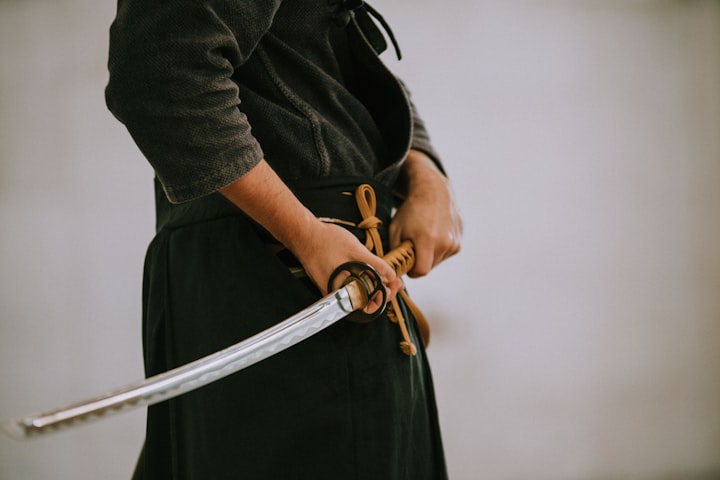What Japanese Culture and Being an Outsider Can Teach You about Writing
All writers are gaijin
As far back as I can remember I’ve always wanted to be a gaijin. Gangster, I meant Gangster. But, you see, I’m gaijin. I’ve always been gaijin. And I think it’s about time that all writers claimed the word gaijin as their own.
Gaijin is a Japanese word that literally means ‘outside person.’ According to my Japanese tutor Gaijin is the polite and proper way to refer to a foreigner. In truth the polite way is gaikokujin; which has the connotations of ‘welcome guest’ or ‘welcome foreigner’ — literally ‘polite form’ ‘outside person.’ And according to my Japanese speaking friends Gaijin is often used as a racist slur against non-Japanese and has many negative connotations. Don’t believe me? Call a Japanese person gaijin and see how they react.
In Japan being labeled as gaijin puts you in your place — it reminds you that you’re an outsider and confers lower status; which is very important in a class based society such as Japan. Don’t get me wrong — most of the people who I met in Japan were lovely, and some were incredibly kind to me; but gaijin was always used as an insult or a stick to beat you with. I got so sick of it that when someone was rude to me in Japanese, I’d smile at them, and in my politest tone of voice speak to them in Welsh or swear at them in Greek. *looks innocent*
I traveled alone round Japan for a month — so far outside of my comfort zone that I started to become comfortable with being uncomfortable and with looking like a complete idiot in front of strangers. I lived on udon noodles, sashimi, and custard donuts; got lost enough to ask for directions on average once every five seconds; and learnt the rudiments of Japanese grammar from repeatedly getting off the Tokyo Metro at the wrong stop.
I was lost in Tokyo, homeless in Kyoto, and set on fire at the Kurama Fire Festival. I had a blast in Hiroshima (no pun intended, tragic history notwithstanding, it’s still my favourite city) and visited Nagasaki, Nikko, and Osaka. I fed Deer biscuits in Nara and a Deer ate my map in Miyajima. I stayed overnight in a Buddhist Temple on Mount Koya in Koyasan (like Butlins but holy) and joined in their morning prayers. And every day I tried to find a book by Haruki Murakami as a gift for a friend. In bookshop after bookshop I baffled and beleaguered the staff. My Japanese was so bad I thought I’d asked if they’d anything in stock by him but what I actually said was: “Does Haruki Murakami live here?”
For the rest of my trip I willfully embraced my gaijin status almost as a badge of honour. And in being outside I found myself; I found my place in the world — or at least how to express where I felt I’d always been which was useful in its own right. I used my truly terrible Japanese speaking ability at every opportunity and learnt more about Japanese language, people, and culture, than I had in years of head scratching back in the UK.
“Traveling is a brutality. It forces you to trust strangers and to lose sight of all that familiar comfort of home and friends. You are constantly off balance. Nothing is yours except the essential things — air, sleep, dreams, the sea, the sky — all things tending towards the eternal or what we imagine of it.” — Cesare Pavese
Wandering round lost in Japan it occurred to me that, not only would I always be gaijin, I’d been an outside person my whole life. Nothing had changed. And if anything being gaijin confers a useful status; especially for a writer. Outsiders aren’t bound by the same conventions. People may appreciate that you try to speak Japanese and follow proper etiquette (that last point even more so as they were often amazed that I knew how to behave!) but there are many things you’d never do as a foreigner that Japanese nationals must get in line with. This is no different from many other countries, of course, it just set me thinking about the comparative benefits of outsider status.
Being in a country where you can’t speak the language creates its own natural barriers — not just to entry but as a barricade against the constant barrage of a media and advertising saturated world. Everything retreats to static and pink noise because you don’t understand it. You’re continually driven back into yourself, in a wordless silence, surrounded by all this noise that you don’t understand. And in a strange way it makes your inner voice louder.
I heard tons of writing that wanted to get written. Words poured out of me but stories got stuck and made me sick if I didn’t write them down; like a fever that you’re supposed to sweat out of you. And in a way it feels like I’ve played against that unwritten backlog all my life. Like I didn’t sweat hard enough to get all the words out and that’s why I’m so fat now. Well that and eating cheesecake!
“I think it’s what songs are. Songs have heat and electricity, and they’re real. If you get a song stuck inside you, hallucinate the pictures of that song and that heat and electricity is in your body. If you can’t get a song out, then you get sick. Just the way there are sadness chemicals in tears, there a song chemicals in songs. If you don’t know how to let it out, it makes you seem like a crazy person. Now that the songs are very pure, I don’t hallucinate and I don’t have a fever.” — Kristin Hersh
The word gaijin could be appropriated by writers. It’s often mistranslated as ‘foreign devil’ because in some languages Jinn means demon or malign spirit; so ‘gai-jin’ also carries vague connotations of being a strange, demonic, malignant outsider. Perfect for writers. Writers are gaijin, irrespective of country, religion, gender, or sexuality. Each world has its own rules. Even gangsters have rules to live by but they’re still a breed apart. Writers are outside people. If you’re not an outsider, culturally, you’re a breed apart insofar as you write at all. Neither better nor degenerate; just different. Writing is open to everyone but it’s a somewhat unusual monkey that takes it up full-time. Writing as a daily practice might seem contrary to normal living but it’s as essential as breathing for those who do.
All writers are gaijin. It felt like that when I was in Japan and I still believe it now — I just never articulated it as well as I’d like. Upon my return to England I discovered scores of writers who’d done a better job such as David Mitchell in a brilliant essay on the relationship between Japan and his writing. So when I saw the chance to send questions for a Librarything Author Interview with him I jumped at the chance. My question was among those selected and he was gracious enough to respond in depth:
From member graffiti.living: As a writer who has lived and worked in Japan at different times in your life, please could you talk a little more about your experiences in Japan and the impact that this has had on your writing?
Trickier to discuss this subject ‘a little’, graffiti.living, than it would be to discuss it for hours. Living in Japan interiorises one, because it is an interiorising culture — if every Japanese citizen expressed his or her own individuality in queues, in shops, on roads, in the family etc to the same degree American citizens do, the place would ignite and explode — imagine 120 million people cooped up on an area of buildable-upon land about the size of, I dunno, Florida?
Writing, too, is an interiorised and interiorizing activity: you live with thoughts, and characters formed, like clay models, from bundles of thoughts, for months or years of your life.
So just living in Japan during my 20s, when the writer who I am was forming, was probably a useful form of isolation. The place itself filled a mental warehouse of raw material, including Dejima, which I’ll probably draw from, to a greater or a lesser extent, for the rest of my life. Finally there are the writers as a result of being in Japan: Haruki Murakami, Tanizaki, Soseki, Mishima when he isn’t being a homoerotic misogynist, Endo — good writers all. Japanese pop culture has kicked up some gifted fantasists, too — Taiichi Yamada (track down a book called Strangers if you’re curious — I think you’ll like it), Akutagawa, the director Hayao Miyazaki. Japan gets under the skin of the young, and it never quite comes out.
To write is to live your life at one remove. You watch life being lived by others instead of living it yourself. You’re too busy scribbling words in another room. You retreat from the world and in a strange way that means you’re more engaged with how the world really is. That’s the real sleight of hand right there. A dragon vein breathes blood beneath the earth. It wants you to write and it wants you to work on its behalf. You’re lucky if you enter into this pact but you’ll still turn to dust like all the rest. So tap the dragon vein whilst you can — it runs beneath the earth in order to steer your dreams.
James Garside is an independent journalist, writer and travel photographer. Subscribe to Chapter 23 for the inside track on their creative projects and insights about life, work and travel.
About the Creator
James Garside
NCTJ-qualified British independent journalist, author, and travel writer. Part-time vagabond, full-time grumpy arse. I help writers and artists to do their best work. jamesgarside.net/links







Comments
There are no comments for this story
Be the first to respond and start the conversation.